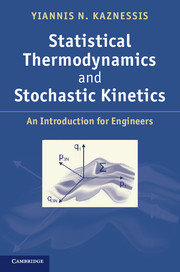Book contents
- Frontmatter
- Contents
- Acknowledgments
- 1 Introduction
- 2 Elements of probability and combinatorial theory
- 3 Phase spaces, from classical to quantum mechanics, and back
- 4 Ensemble theory
- 5 Canonical ensemble
- 6 Fluctuations and other ensembles
- 7 Molecules
- 8 Non-ideal gases
- 9 Liquids and crystals
- 10 Beyond pure, single-component systems
- 11 Polymers – Brownian dynamics
- 12 Non-equilibrium thermodynamics
- 13 Stochastic processes
- 14 Molecular simulations
- 15 Monte Carlo simulations
- 16 Molecular dynamics simulations
- 17 Properties of matter from simulation results
- 18 Stochastic simulations of chemical reaction kinetics
- Appendices
- Index
- References
16 - Molecular dynamics simulations
Published online by Cambridge University Press: 05 December 2011
- Frontmatter
- Contents
- Acknowledgments
- 1 Introduction
- 2 Elements of probability and combinatorial theory
- 3 Phase spaces, from classical to quantum mechanics, and back
- 4 Ensemble theory
- 5 Canonical ensemble
- 6 Fluctuations and other ensembles
- 7 Molecules
- 8 Non-ideal gases
- 9 Liquids and crystals
- 10 Beyond pure, single-component systems
- 11 Polymers – Brownian dynamics
- 12 Non-equilibrium thermodynamics
- 13 Stochastic processes
- 14 Molecular simulations
- 15 Monte Carlo simulations
- 16 Molecular dynamics simulations
- 17 Properties of matter from simulation results
- 18 Stochastic simulations of chemical reaction kinetics
- Appendices
- Index
- References
Summary
Molecular dynamics (MD) simulations generate trajectories of microstates in phase space. They simulate the time evolution of classical systems by numerically integrating the equations of motion.
With their strength tied to available computer speed, simulations continue to become a more powerful tool. A letter to the Journal of Chemical Physics by B. J. Alder and T. E. Wainwright in 1957 was the first work that reported results from molecular dynamics simulations. The Lawrence Radiation Laboratory scientists studied two different sized systems with 32 and 108 hard spheres. They modeled bulk fluid phases using periodic boundary conditions. In the paper they mention that they counted 7000 and 2000 particle collisions for 32 and 108 particle systems, respectively. This required one hour on a UNIVAC computer. Incidentally, this was the fifth such commercial computer delivered out of the 46 ever produced. The computer cost around $200 000 in 1952 and each of ten memory units held 100 words or bytes. Nowadays, a $300 personal computer with a memory of approximately 500 000 000 bytes can complete this simulation in less than 1 second. And Moore's empirical law that computer power doubles every 18 months still holds.
Alder and Wain wright computed the pressure of the system and their results compared favorably to results of Monte Carlo simulations of the same system. In the paper, they state in an unduly reserved manner that “this agreement provides an interesting confirmation of the postulates of statistical mechanics for this system.”
- Type
- Chapter
- Information
- Statistical Thermodynamics and Stochastic KineticsAn Introduction for Engineers, pp. 273 - 286Publisher: Cambridge University PressPrint publication year: 2011



